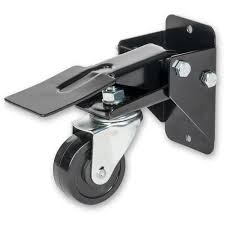From home offices to industrial processing plants, there are casters being used in all kinds of personal and professional environments. Buying them, however, is a little different from admiring them in the wild. There are certain purchase considerations to take into account before you hand over your credit card, so keep these things in mind while you shop for your next set of wheels.
1. Material
Casters can be made out of everything from iron to mold-on rubber. While materials like stainless steel are probably the most common, you can find all kinds of all project types. Whether you’re looking for something strong and sturdy for construction work or something gentle that won’t damage the hardwood floors of your home library, there are casters out there for you.
2. Size
Instead of being measured in height and width, casters are usually discussed in terms of diameter and radius. Weight is also an issue; if you want your wheels to hold up something very heavy, they’ll need to have a certain heaviness of their own in order to meet your load-bearing requirements. Make sure to look at all of these numbers while you shop for casters.
3. Swivel
The “swivel” of a caster refers to how easy it can maneuver on floors and carpets. The greater the swivel, the more mobility that you’ll enjoy from the wheel. Don’t make the mistake of thinking that you always need a flexible caster, however; some industries prefer to have rigid, non-swivel wheels on things like hospital carts and kitchen islands. Too much moving around can damage their goods, so they might want casters without a drift factor.
4. Special Features
Speaking of rigid casters, there are some that come with special locking and braking mechanisms to prevent out-of-control carts from gaining momentum. You can also find casters that are built with a “twin wheel” design for maximum turn control. There’s no limit to the range of special features that casters can offer, so don’t be shy about shopping around and seeing what’s out there. You never know when a certain set of wheels will speak to you.
5. Price
Caster wheels are sold both individually and in bulk, so pay attention when looking at prices. You don’t want to confuse the bottom line of one with the bottom line of another. An easy way to avoid confusion is to look at the price per unit (PPU) instead of anything else; this will let you know how much each caster costs by itself, so you can make your budgetary decisions based on that.
6. Finish
Last but certainly not least, consider the finish of the casters that you’ll be buying. They can make all the difference in the longevity or durability of your purchase, so it’s worth the effort of comparing and contrasting different types. For example, zinc is a very strong material that resists dirt and rust, so you won’t have to worry about the cleanliness of casters with a zinc finish. You might be willing to pay a few extra dollars for that.
Casters have many uses both inside the home and around industrial work environments. If you’re in the market for casters, keep these things in mind while making your final selection. You’ll want to be confident in your choice and comfortable with spending money on your chosen wheels.

